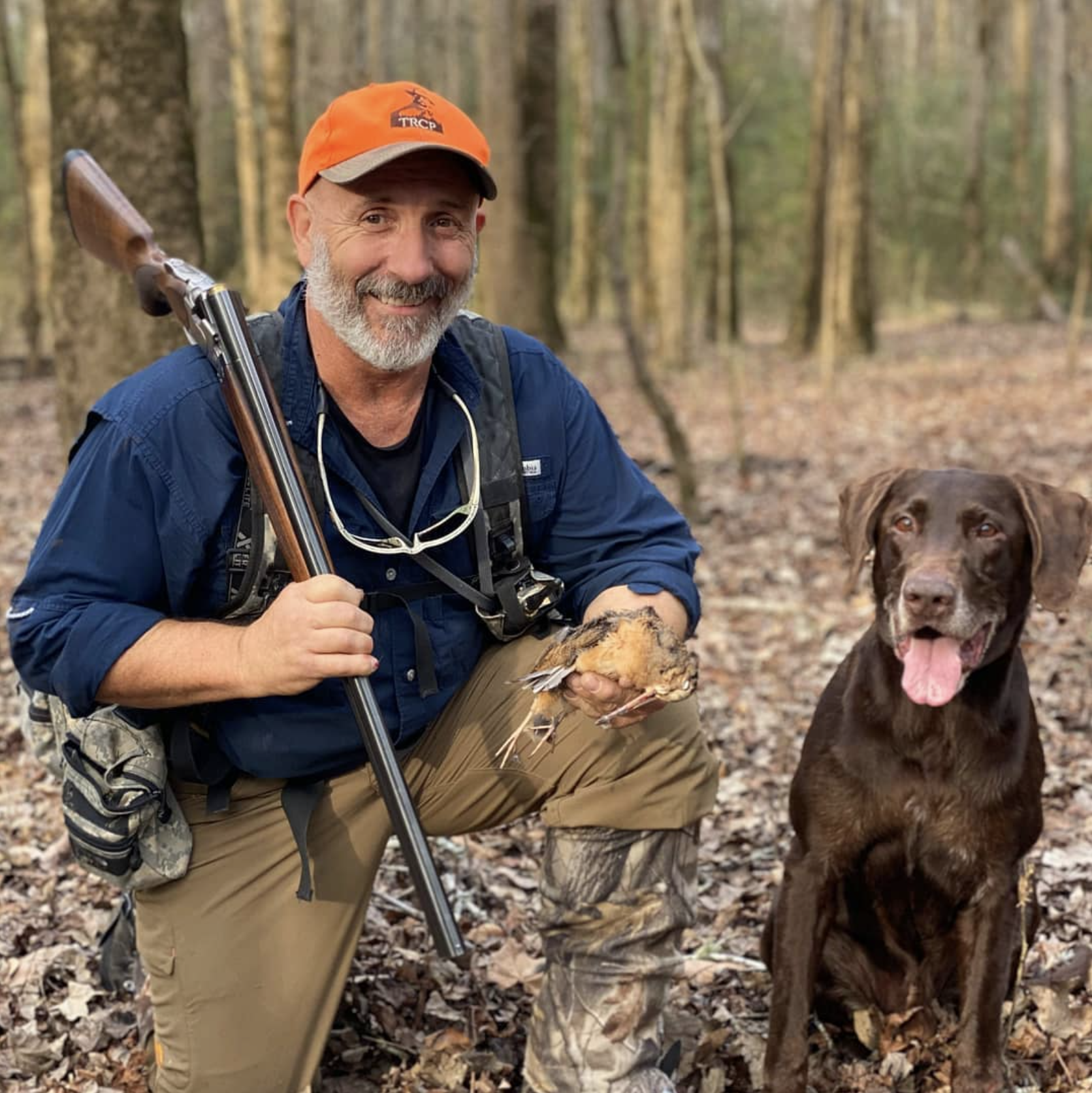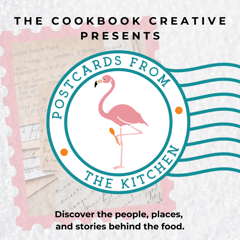
Conservation & Wild Game Cooking With Ed Arnett, PhD
The Cookbook Creative

Listen to our interview with Ed on our Podcast:
Spotify
Apple
Hunting, Conservation, and a Healthy Appetite for Wild Game
In a rapidly changing world, where our connection to nature is becoming more strained every day, we wanted to talk to someone who could reflect on the importance of hunting and conservation. (And maybe give us a few tips on cooking wild game!) These age-old practices not only sustain us with natural foods but also foster a deep respect for wildlife and help preserve ecosystems for generations to come.
We reached out to Ed Arnett, PhD. He is CEO of The Wildlife Society, an organization dedicated to inspiring, empowering, and enabling wildlife professionals in their mission to sustain wildlife populations and habitats. Elaine Acker met Ed when she wrote about and photographed Ed’s work with bats and the timber industry for the conservation magazine, Bats. Ed later worked with Elaine at the nonprofit, Bat Conservation International, and became a valued leader.
In this interview, she explores current attitudes towards hunting, the vital role hunters play in conservation efforts, and Ed’s annual Beast Feast cookout, which brings communities together around food and heritage.
Today’s Attitudes towards Hunting
Since day one, humans have relied on animals for food and celebrated the harvest. But modern lifestyles and urbanization have led to a growing disconnect from nature, prompting some to question the need for hunting when groceries are readily available.
That disconnect happened as society became increasingly urbanized and created a gap between people and the natural world. In turn, this led to misconceptions about sustainable habitats, hunting, and wildlife management.
Today, only 14 percent of Americans live in rural communities. Just 100 years ago, the opposite was true. Now, many people don’t understand the origins of their food. They rely on supermarkets, unaware of the complex processes involved in providing a warm meal for the kitchen table.
“Aldo Leopold is the founder of the modern wildlife management profession,” says Ed. He holds up a book. “I would encourage everyone to read his book, A Sand County Almanac. One of Leopold's greatest fears was that people would someday think that heat comes from the furnace and breakfast comes from the grocer. His point was that people, as they become disconnected from nature, lose that interconnectedness of humans and wildlife – wild places.”
Despite the disconnect, polls tell us that over 70 percent of Americans support hunting for food. This widespread acceptance acknowledges the organic nature of obtaining food through sustainable hunting practices.
Many choose to hunt or consume wild game because it’s the best way to ensure your meals come from reliable and traceable source. “I like knowing where my food comes from,” says Ed. “It's as organic as it gets. There's nothing more organic than going out and harvesting your own food--procuring it with your own two hands.”
Elaine told Ed about hunting and fishing with her father Gerald, and Ed was quick to echo the importance of shared family experiences in nature. “You hit on something really important,” says Ed. “Tradition and family connection and experiences. I don't know if I would have become a wildlife biologist had my grandfather not taken me hunting when I was a small child, long before I could even legally hunt. Being able to get outside with him and experience the outdoors fostered my love for nature. Some people have asked me how I can say I love wildlife if I’m a hunter. I don't know any sporting individuals that that don’t love wildlife.”
Hunters Protect Wildlife and Preserve Ecosystems
-3.png?width=250&height=313&name=Untitled%20design%20(1)-3.png) Hunters have long been at the forefront of conservation. Their contributions extend beyond merely taking part in regulated activities; they self-regulate and contribute significant financial resources that help safeguard ecosystems and wildlife populations.
Hunters have long been at the forefront of conservation. Their contributions extend beyond merely taking part in regulated activities; they self-regulate and contribute significant financial resources that help safeguard ecosystems and wildlife populations.
“Some would argue, historically, that it was hunters that decimated a lot of game species, and they’d be right, says Ed. But sportsmen and women recognized the negative impact they were having and began imposing regulations upon themselves to protect dwindling populations.”
As awareness grew, legislation was enacted, including the Lacey Act, which outlawed market hunting. The implementation of state-level laws addressing seasons and bag limits further demonstrated the growing commitment of sportsmen to conserve natural resources.
Self-imposed regulations became the foundation for sportsmen’s transition from potential culprits to dedicated conservationists. Organizations like the Boone and Crockett Club, founded by hunters in the late 19th century, emphasized responsible hunting practices and worked towards preserving wildlife habitats.
Hunters have been key advocates for legislation that supports conservation efforts. The Pittman Robertson Act established an excise tax on firearms and ammunition, with funds directly allocated to wildlife conservation. Similarly, the Duck Stamp Act channels revenue generated from waterfowl hunting licenses into wetland preservation projects.
The financial support provided by hunters through license fees, taxes, and donations plays a crucial role in funding wildlife conservation initiatives. These contributions generate significant revenue for state agencies responsible for managing ecosystems and ensuring the sustainable use of natural resources.
The Joy of Beast Feast: Celebrating Harvest, Heritage, and Community
Every year, Ed hosts Beast Feast, a celebration of tradition and community. Ed serves wild game harvested throughout the year and brings together friends and family in a celebration of wildlife and nature.
Beast Feast started as a professor’s potluck gathering during Ed’s college days. But over the years, Ed’s version of Beast Feast has transformed from a small gathering into a grand celebration, bringing together people from across the country. “At first, I just invited people over and cooked what I had harvested the year before,” says Ed. “Now, it’s morphed into a full celebration, and I have friends coming from all over - coast to coast – from Seattle to Florida.
“People even come a couple of days early to help prep,” says Ed. “I have to let people help me, because it's gotten too big, but that’s half the fun. I've hosted as many as 120 people.”
What’s everyone’s favorite dish? “Ribeye in the sky,” says Ed. “Grilled sandhill crane breasts!”
While the big celebration happens once a year, every day is Beast Feast in the Arnett household. He and his wife Glenda eat wild game from the freezer all year long. It’s a healthy source of protein, and decreases reliance on the commercial meat industry. As Ed says, “this is as organic as it gets.”
Cooking Wild Game
The biggest mistake people make when cooking wild game is overcooking the meat.
“Wild game meat is always 30 seconds away from becoming the proverbial shoe leather,” says Ed. “It can quickly become liver-y tasting with game-y flavors people don't like. When cooking red wild game meat, think rare to medium-rare, which is my target and favorite.”
Wild game dishes don’t have to be fancy. You can explore new recipes and get creative by substituting wild game meat in almost any of your favorite recipes.
When we asked Ed for tips on preparing wild game, he shared these.
- You can "wet age" game meat by vacuum-sealing the meat and letting it sit for several days in the refrigerator to help break down the muscle fibers. This is in addition to any dry aging – hanging the meat for several days to age. “Most people aren't aware that the best and most tender filet mignon is just days away from being rotten,” says Ed. “Yes, it should be aged that long for tenderness and perfection.” Meat can also be marinated overnight or even for several days before cooking.
- Keep it simple when grilling. “For red meat, drizzle the meat with olive oil and season it with your favorite seasoning,” says Ed. “Then cook it on a hot grill for just a few minutes on each side until it’s medium rare: duck, goose, crane, sage grouse, deer, elk... it doesn't matter. You just can't go wrong with basic grilling. For white-meat game birds, use the same technique, but grill them a little longer until the temperature reaches medium.
- Explore recipes featured on some of Ed’s favorite television shows or in cookbooks. Shows include Meateater, Farming the Wild, and Dead Meat. “I love Hank Shaw's cookbook series on game cooking,” says Ed, “and the titles are great too: Buck, Buck, Moose; Duck, Duck, Goose; Pheasant, Quail, Cottontail; and Hook, Line, Supper! I also like Steve Rinella's cookbooks.”
Quick Q & A
Elaine: What would you never want to eat again?
Ed: Tofu on a stick.
Elaine: What’s your favorite kitchen gadget?
Ed: A very good, very sharp, chef’s knife.
Elaine: What food can you eat over and over again and never get tired of?
Ed: Venison tacos.
Elaine: What’s your most memorable food experience?
Ed: I was at a camp in Botswana called the Mashatu camp. And we sat around what's called a BOMA – the British Officers Mess Area. So, there’s a little bit of carryover from British colonization. We were served game such as kudu and impala that had been taken by hunters. By the way, the FDA doesn’t hunters to bring meat back from Africa. That’s why you just see the trophy heads or hides. But believe me, the meat gets consumed. Every last bit of it. Botswana was a unique experience.
You can find Ed and The Wildlife Society Here
The Wildlife Society
As CEO of The Wildlife Society, Ed leads an esteemed organization that serves professionals dedicated to advancing-1.png?width=291&height=364&name=Untitled%20design%20(2)-1.png) conservation efforts, nurturing scientific expertise, and advocating for sustainable practices. Membership is open to all individuals passionate about wildlife conservation, regardless of their professional background. By becoming a member, individuals gain access to valuable resources, networking opportunities, and avenues for professional development in the field of wildlife management.
conservation efforts, nurturing scientific expertise, and advocating for sustainable practices. Membership is open to all individuals passionate about wildlife conservation, regardless of their professional background. By becoming a member, individuals gain access to valuable resources, networking opportunities, and avenues for professional development in the field of wildlife management.
To join, visit Wildlife.org
This American Land
Ed’s first appearance on This American Land was as a guest, helping share the story of the sage grouse. Less than a month later, he’d been recruited as the host, and the show is entering its 12th season on PBS. “I’m a nerdy scientist,” says Ed, “but I can spin a yarn and take complex ecological issues, such as a conservation project happening in the Nevada desert, and make them relevant to an urban family living in Chicago. I want them to know why they should care, and to walk away understanding conservation – and what they can do to help - just a little bit better.
You can find episodes of This American Land on YouTube
-1.png)
